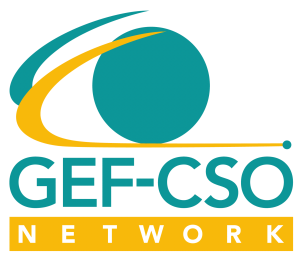In line with the decision of the GEF Council in November 2008, the accreditation system for Civil Society organizations operated by the GEF Secretariat is replaced by a membership system operated by the Network. The membership admission/accreditation process and maintenance of the membership database is thus the responsibility of the Network. Organisations which are admitted as members of the Network will be eligible to attend GEF Consultations and Assembly meetings in a similar manner to formerly accredited organizations.
Main criteria for membership
- Non-profit status: The organization must be a non-governmental, non-profit, non-religious, non-political, and non-racial organization.
- Environment focus: It should specifically include environment protection and sustainable use as one of its important objectives and practices in its programs, projects, and office(s).
Membership benefits
CSOs (Civil Society Organizations) should consider becoming members of the GEF CSO Network for several compelling reasons:
- Global Impact: The GEF (Global Environment Facility) is a critical international organization dedicated to addressing pressing environmental and sustainability challenges on a global scale. By joining the GEF CSO Network, CSOs gain a platform to engage in and influence global environmental policy and action.
- Advocacy Power: Membership provides CSOs with a collective voice and increased advocacy power. Together, CSOs within the network can advocate for environmental protection, sustainable development, and equitable resource allocation with a stronger impact than they might achieve individually.
- Access to Resources: Being part of the GEF CSO Network grants access to valuable resources, including funding opportunities, technical expertise, and knowledge sharing. CSOs can tap into these resources to enhance their capacity and effectiveness in addressing environmental challenges.
- Networking Opportunities: Membership in the network facilitates networking and collaboration with like-minded organizations from around the world. This enables CSOs to learn from each other’s experiences, share best practices, and forge partnerships that can lead to more comprehensive and impactful initiatives.
- Capacity Building: The GEF CSO Network can help provide access to training, workshops, and capacity-building programs. These opportunities help CSOs improve their skills, knowledge, and organizational capabilities, ultimately strengthening their ability to contribute meaningfully to environmental sustainability efforts.
- Information and Insights: CSOs gain access to valuable information, data, and insights related to global environmental issues and GEF projects. This information can inform their advocacy work, research, and project planning.
- Influence on Policy: Membership allows CSOs to participate in GEF decision-making processes, ensuring that their perspectives and concerns are considered in the development and implementation of environmental policies and projects.
- Alignment with Values: Many CSOs have a core mission of environmental protection and sustainability. Joining the GEF CSO Network aligns with their values and provides a platform to actively contribute to these causes on a global scale.
- Visibility and Recognition: Being part of an internationally recognized network enhances the visibility and credibility of CSOs. It can also lead to greater recognition for their contributions to environmental protection and sustainable development.
- Collective Impact: Together, CSOs in the GEF CSO Network can make a significant collective impact on global environmental challenges. By working collaboratively, they can drive positive change that benefits not only their local communities but also the planet as a whole.
CSOs should become members of the GEF CSO Network to amplify their voices, access resources, collaborate on a global scale, and contribute effectively to the vital mission of safeguarding the environment and promoting sustainable development worldwide.
Membership opportunities
The GEF remains committed to further enhancing its engagement with CSOs to improve the effectiveness and efficiency of operations. Civil society stakeholders are encouraged to engage with the GEF by:
- Commenting on project proposals: Since GEF Agencies are required to consult CSOs for project approval, these may comment on project proposals, or be involved in project consultations, by contacting the GEF Agency project officer for a particular project and/or the operational focal point at the government level. The GEF Project Identification Form (PIF) for each project also indicates the project contact person, and are available in the GEF project database.
- Commenting on policies: GEF policy proposals are published in advance of GEF Council meetings on the Council documents webpage. Stakeholders can contribute by providing inputs, feedback, suggestions and recommendations through their regional CSO representative in the GEF CSO Network, through GEF Council Members, or by directly sending their comments on the GEF website ongoing consultations tab.
- Supporting project implementation, monitoring and evaluation: Civil society organizations play an important role in monitoring project and program activities along with GEF Agencies and GEF Focal Points, as well as in providing feedback as beneficiaries or as representatives of community groups, including through the GEF Independent Evaluation Office.
- Participating in GEF events: GEF Council meetings are webcasted live and their recordings uploaded onto the GEF YouTube channel. Civil society stakeholders may also apply and be selected to attend these Council meetings, as indicated in the Updated Vision. Also, the GEF Country Support Programme (CSP) provides opportunities for stakeholder engagement and learning about the GEF’s work and activities, including through Expanded Constituency Workshops (ECWs).
- Making a formal complaint or grievance relating to GEF projects and operations, including concerns about possible corruption or fraud: The GEF Conflict Resolution system provides stakeholders with an avenue to submit complaints or concerns about GEF-supported projects and operations. These may be submitted to the responsible GEF Agencies and/or the GEF Conflict Resolution Commissioner. In addition to the above, the World Bank staff rules on matters of ethics, integrity, fraud and corruption apply to staff of the GEF Secretariat, while the GEF’s Policy on Ethics and Conflict of Interest for Council Members, Alternates, and Advisers applies for these individuals. Any concerns on these matters may be raised through the World Bank hotline.
Apply now
Welcome to the GEF CSO Network. We invite you to join us in our mission to make a positive impact on the environment. Apply for membership today and be part of a global community dedicated to sustainability and conservation.
